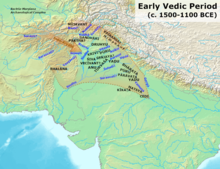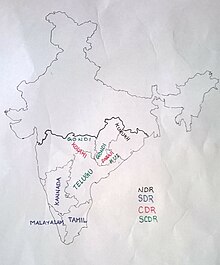This is an old revision of this page, as edited by EdJohnston (talk | contribs) at 20:06, 10 May 2018 (→Slavery in India: new section). The present address (URL) is a permanent link to this revision, which may differ significantly from the current revision.
Revision as of 20:06, 10 May 2018 by EdJohnston (talk | contribs) (→Slavery in India: new section)(diff) ← Previous revision | Latest revision (diff) | Newer revision → (diff)
|
Archives |
|
Index 1, 2, 3, 4, 5, 6, 7, 8, 9, 10 |
 | This user is busy in real life and may not respond swiftly to queries. |
Please comment on Talk:Antisemitism in the Labour Party
The feedback request service is asking for participation in this request for comment on Talk:Antisemitism in the Labour Party. Legobot (talk) 04:26, 27 April 2018 (UTC)
Stop censorship
If you don't like what I'm adding, don't censor it. Irfan Habib isn't talking about any Aryan invasion, but simply a migration which is the topic. So I fail to see your problem.
If it's simply because of the interpretations about Dasas being dark-complexioned, you can add a contrary view. But you cannot pick and choose what to add or remove. It is unethical to only consider one reliable source as correct and censor another reliable source.
As for taking a break, I will not be cowing down to your threats or letting you get away with what you want. Reliably sourced and relevant content should be added MonsterHunter32 (talk) 22:18, 30 April 2018 (UTC)
- Well, it seems that you are back to square-A. Your wish. Don't say that I didn't warn you. -- Kautilya3 (talk) 22:44, 30 April 2018 (UTC)
- You have been removing me over the similar things: The first - Aryan invasion, I already dropped it. The second - different color of Dasas/Dasyus. If you have contradictory opinions, you can add it. But it's clear, you are only removing content based on what you don't agree with. MonsterHunter32 (talk) 04:58, 1 May 2018 (UTC)
Harappan, Vedic, Dravidian



Never realised that the late Harappans were kind of split-up; sites had moved north and south, due to aridisation. See Giosan (2012) p.4. and Narasimhan et al. (2018). So, which Harappans moved south and mixed with the hunter-gatherers to form the Dravidians? Quite obvious, isn't it? Joshua Jonathan -Let's talk! 14:06, 1 May 2018 (UTC)
- Not really. If you are saying that Dravidian languages spread from the IVC, then it would have had to happen while the IVC was still flourishing. After it died, there is hardly any reason for its language to spread, because it didn't just spread, it replaced whatever languages were spoken earlier in South India. For that to happen, there would have had to be strong cultural/technological reasons that gave the new language dominance. After the IVC died, there were no such reasons.
- My feeling is that the IVC-Dravidian connection is a red herring. I think the IVC people just stayed where they were and mixed with new people that came. They were a settled civilization, not nomads like the Aryans were. -- Kautilya3 (talk) 16:58, 1 May 2018 (UTC)
- Narasimhan eta al. (2018) p.14:
the ASI and ANI were both largely unformed at the beginning of the 2nd millennium BCE, and imply that the ASI may have formed in the course of the spread of West Asian domesticates into peninsular India beginning around 3000 BCE (where they were combined with local domesticates to form the basis of the early agriculturalist economy of South India (40)), or alternatively in association with eastward spread of material culture from the Indus Valley after the IVC declined (41). Further evidence for a Bronze Age formation of the ASI comes from our analysis of Austroasiatic-speaking groups in India such as Juang, who have a higher ratio of AASI-to-Iranian agriculturalist-related ancestry than the ASI (Fig. 3, Supplementary Materials). Austroasiatic speakers likely descend from populations that arrived in South Asia in the 3 rd millennium BCE (based on hill cultivation systems associated with the spread of Austroasiatic languages (20)), and our genetic results show that when Austroasiatic speakers arrived they mixed with groups with elevated ratios of AASI- to Iranian-agriculturalist-related ancestry than are found in the ASI, showing that the ASI had not yet overspread peninsular India.
- And Razib Khan (january 18, 2018), The Dravidianization of India:
The reason that the ratio of Iran_N to Steppe_EMBA does not decline monotonically as one goes from west to east along North Indian plain is that Indo-Aryans were not expanding into a Dravidian India. Dravidian India was expanding only somewhat ahead of Indo-Aryan India, and in some places not all at all.
- Joshua Jonathan -Let's talk! 20:40, 1 May 2018 (UTC)
- Note that Narasimhan et al. are ambivalent about the linguistic connections:
A parsimonious hypothesis is that as Steppe_MLBA groups moved south and mixed with Indus_Periphery-related groups at the end of the IVC to form the ANI, other Indus_Periphery-related groups moved further south and east to mix with AASI groups in peninsular India to form the ASI. This is consistent with suggestions that the spread of the IVC was responsible for dispersing Dravidian languages (42-44), although scenarios in which Dravidian languages derive from pre-Indus languages of peninsular India are also entirely plausible as ASI ancestry is mostly derived from the AASI.

- I don't doubt that agriculture spread from the IVC. The "tale of two continents" map shows it spreading between 3500 BC and 2000 BC. But this is an impressionistic map. The spreading is most likely to have happened by sea when the IVC was its peak and they had plenty of ships. The farmers would have settled in the coastal regions first and gradually spread inward.
- But the problem is in the assumption that this spreading carried with it a language which replaced the earlier language of South India. If that is so, then how would you explain isolated tribal Dravidian languages in the midst of Indo-Aryan regions? Why would the forest-dwelling tribes come down to learn the Dravidian language of the agriculturists, but then refuse to learn an Indo-Aryan language afterwards? A more reasonable hypothesis is that they were speaking Dravidian languages from the beginning (whatever the "beginning" might be).
- The agriculturists could have added a layer to the Dravidian language, as i mentioned earlier. I would hazard a guess that the anna language is what got added by the agriculturists (whom I call "Mesopotamians" rather than "Iranians") whereas the thambi language is the older one (a reasonable guess based on the fact that anna means elder brother and thambi means younger brother.) Moreover, this layering could have happened within the IVC itself, before it got carried to South India. All said and done, I guess I am claiming "indigeneous Dravidians". -- Kautilya3 (talk) 22:46, 1 May 2018 (UTC)
And the recent phylogenic study says:
We find the general congruence across models on a median root age for the Dravidian language family of around 4000–4500 years ago including similar 95% HDP ranges supportive of a positive evaluation of the dating results. Nevertheless, the uncertainty on the root age is large, especially for the best-fitting analyses featuring a relaxed clock. Therefore, we cannot exclude the possibility that the root of the Dravidian language family is 6000 or 6500 years old.
-- Kautilya3 (talk) 07:35, 2 May 2018 (UTC)
Please comment on Talk:Judicial Watch
The feedback request service is asking for participation in this request for comment on Talk:Judicial Watch. Legobot (talk) 04:31, 2 May 2018 (UTC)
Good faith reminder
![]() Welcome to Misplaced Pages. Although everyone is welcome to contribute constructively to the encyclopedia, we would like you to assume good faith while interacting with other editors. Unsubstantiated and spurious accusations like this are to the detriment of this spirit. Take a look at the welcome page to learn more about contributing to this encyclopedia. Thank you. JosephusOfJerusalem (talk) 00:33, 3 May 2018 (UTC)
Welcome to Misplaced Pages. Although everyone is welcome to contribute constructively to the encyclopedia, we would like you to assume good faith while interacting with other editors. Unsubstantiated and spurious accusations like this are to the detriment of this spirit. Take a look at the welcome page to learn more about contributing to this encyclopedia. Thank you. JosephusOfJerusalem (talk) 00:33, 3 May 2018 (UTC)
- Honestly, I wasn't born yesterday. -- Kautilya3 (talk) 15:43, 3 May 2018 (UTC)
Please comment on Talk:Trump–Russia dossier
The feedback request service is asking for participation in this request for comment on Talk:Trump–Russia dossier. Legobot (talk) 04:27, 6 May 2018 (UTC)
Today's chuckle
-- Kautilya3 (talk) 19:01, 7 May 2018 (UTC)
- Fascinating. Vanamonde (talk) 04:57, 8 May 2018 (UTC)
Please comment on Talk:Dana Loesch
The feedback request service is asking for participation in this request for comment on Talk:Dana Loesch. Legobot (talk) 04:29, 9 May 2018 (UTC)
Slavery in India
Hello Kautilya3. Recently this page showed up at WP:RFPP, where User:Dlohcierekim applied two days of semiprotection. Since I see your name in the history, I wonder if you have an opinion on what to do. There is some kind of revert war about tens of thousands of bytes of text, which goes back and forth. Do you think the article would benefit from an WP:RFC? Then we would at least know what the fight was about :-). Thanks, EdJohnston (talk) 20:06, 10 May 2018 (UTC)